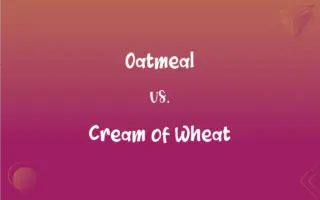Perception vs. Judgement: What's the Difference?
Edited by Janet White || By Harlon Moss || Published on January 31, 2024
Perception is the process of interpreting sensory information, while judgment is the evaluation or decision-making based on that interpretation.

Key Differences
Perception involves the sensory interpretation of the world around us, forming an understanding based on stimuli. Judgment, conversely, is the cognitive process of forming opinions or making decisions based on perceptions and reasoning.
Perception is largely passive, occurring as we absorb information through our senses. Judgment is an active process, involving the assessment of information and often leading to conclusions or actions.
The role of perception is to provide raw sensory input and initial interpretation. Judgment takes this input and applies reasoning, potentially influenced by beliefs and experiences, to reach conclusions.
Perceptions can vary greatly among individuals, influenced by their unique sensory experiences. Judgments, while based on perceptions, also incorporate personal values, biases, and logical reasoning.
Perception often forms the basis upon which judgments are made, serving as the foundational sensory understanding. Judgment goes beyond mere perception, involving the analysis and decision-making process.
ADVERTISEMENT
Comparison Chart
Nature
Interpretation of sensory information
Evaluation and decision-making
Process
Largely passive
Active
Role
Provides raw sensory input
Applies reasoning to input
Influence
Based on sensory experiences
Influenced by values, biases, and reasoning
Outcome
Initial understanding
Conclusions or actions
ADVERTISEMENT
Perception and Judgement Definitions
Perception
Perception involves how we see and understand the world around us.
Her perception of the situation was influenced by her past experiences.
Judgement
Judgment is evaluating situations or people and deciding a course of action.
His poor judgment in that situation led to negative consequences.
Perception
Perception is our cognitive response to sensory input.
Her perception of the melody varied from the actual notes played.
Judgement
Judgment involves forming an opinion or estimation about something or someone.
His judgment of the artwork was based on years of study.
Perception
Perception is the process of recognizing and interpreting sensory stimuli.
His perception of the colors in the painting was unique.
Judgement
Judgment is the ability to make considered decisions or come to sensible conclusions.
Her judgment in the crisis was commendable.
Perception
Perception is the way our brain processes what our senses detect.
The loud noise altered his perception of the environment.
Judgement
Judgment is the act of making a decision based on knowledge and reasoning.
Her sound judgment in business matters is well-respected.
Perception
Perception is the mental interpretation of our sensory experiences.
The optical illusion challenged our usual perceptions of space.
Judgement
Judgment is the process of forming an opinion after careful consideration.
The jury's judgment was based on the evidence presented.
Perception
The process of perceiving something with the senses
The perception of a faint sound.
Judgement
Variant of judgment.
Judgement
Alternative spelling of judgment.
Judgement
The legal document stating the reasons for a judicial decision;
Opinions are usually written by a single judge
Judgement
An opinion formed by judging something;
He was reluctant to make his judgment known
She changed her mind
Judgement
The cognitive process of reaching a decision or drawing conclusions
Judgement
Ability to make good judgments
Judgement
The capacity to assess situations or circumstances shrewdly and to draw sound conclusions
Judgement
(law) the determination by a court of competent jurisdiction on matters submitted to it
Judgement
The act of judging or assessing a person or situation or event;
They criticized my judgment of the contestants
FAQs
What is judgment?
The process of making decisions or forming opinions based on information.
Can judgment be taught or improved?
Yes, judgment can be developed with experience, knowledge, and critical thinking.
Is perception always accurate?
No, perception can be influenced by various factors and may not always reflect reality.
Is judgment always conscious?
Not always, some judgments can be instinctive or subconscious.
Does culture influence perception?
Yes, cultural background can significantly influence how one perceives things.
What is perception?
The process of interpreting sensory information.
Do perception and judgment always align?
Not necessarily, as judgment can be influenced by factors beyond perception.
Can judgments be objective?
Ideally, but they are often influenced by personal biases and subjective factors.
Is judgment a skill?
Yes, it's a cognitive skill that involves reasoning and decision-making.
Can two people have the same perception of an event?
It's possible, but individual differences often lead to varied perceptions.
Can judgment be improved with experience?
Yes, experience can enhance one's ability to make sound judgments.
Are perceptions purely personal?
Largely, as they are based on individual sensory experiences and interpretations.
Are perceptions influenced by emotions?
Yes, emotions can significantly influence how one perceives situations.
Can judgment be biased?
Yes, judgments can be affected by personal biases and preconceptions.
Do perceptions change over time?
Yes, they can evolve with new experiences and knowledge.
How do perceptions affect behavior?
Perceptions can shape one's understanding and reactions to the world around them.
How does education influence judgment?
Education can provide the knowledge and critical thinking skills to enhance judgment.
Is perception a passive process?
Largely, as it involves receiving and interpreting sensory stimuli.
Is judgment essential for problem-solving?
Yes, it's crucial in evaluating options and making decisions.
Can perceptions be deceptive?
Yes, perceptions can be misleading due to various factors like illusions or biases.
About Author
Written by
Harlon MossHarlon is a seasoned quality moderator and accomplished content writer for Difference Wiki. An alumnus of the prestigious University of California, he earned his degree in Computer Science. Leveraging his academic background, Harlon brings a meticulous and informed perspective to his work, ensuring content accuracy and excellence.
Edited by
Janet WhiteJanet White has been an esteemed writer and blogger for Difference Wiki. Holding a Master's degree in Science and Medical Journalism from the prestigious Boston University, she has consistently demonstrated her expertise and passion for her field. When she's not immersed in her work, Janet relishes her time exercising, delving into a good book, and cherishing moments with friends and family.








































































